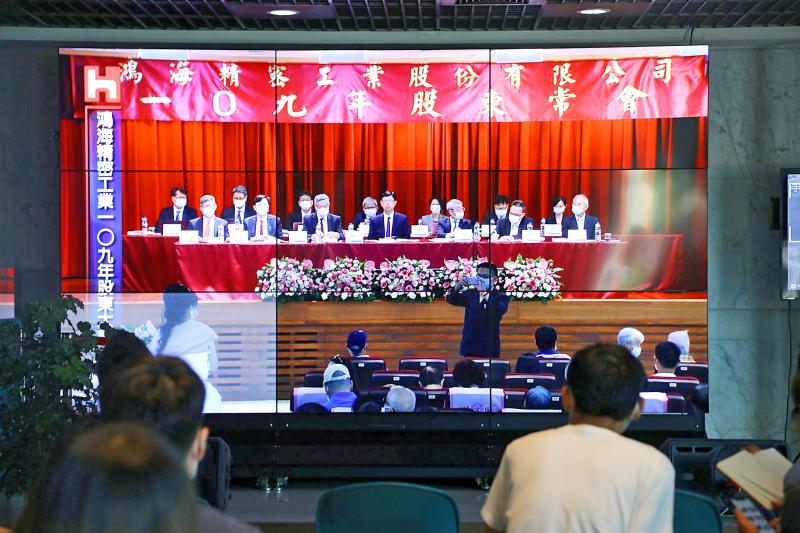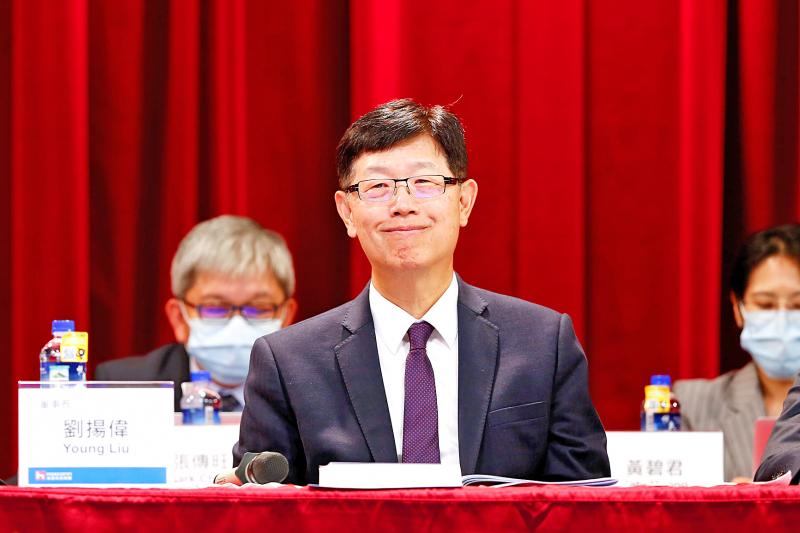Hon Hai Precision Industry Co (鴻海), Apple Inc’s largest iPhone assembler, has mapped out a five-year plan to drive growth for the company, chairman Young Liu (劉揚偉) told shareholders at an annual general meeting in New Taipei City yesterday.
Highlighting a three-step plan revolving around digital transformation, Liu said the company is focused on developing three core technologies: artificial intelligence, semiconductors and new-generation communication.
“To improve our profit margin, we have set our sights on three new industries: electric vehicles, digital healthcare and robotics,” Liu said.

Photo: Reuters / Ann Wang
Upon succeeding Hon Hai founder Terry Gou (郭台銘) as chairman last year, Liu has vowed to increase the company’s gross margin from about 6 percent to 10 percent within five years.
“With a compound annual growth rate of more than 20 percent ... output value from these industries are estimated to reach US$1.4 trillion by 2025,” Liu said, expressing the hope to claim up to 10 percent of market share.
Pointing to saturation in the information and communications technology industry, Liu said that the company would see little growth if it focuses only on its main assembling business.

Photo: Bloomberg / Ashley Pon
Heavily reliant on Apple’s orders of iPhones, which are mostly still assembled at its China plants, Hon Hai has witnessed an 89.49 percent drop in net profit for last quarter due to the COVID-19 pandemic.
The company has trimmed its outlook for this year following a dampened smartphone market.
Liu said Hon Hai is cutting down on management and operational costs to recover from losses.
Hon Hai’s shareholders approved a plan to distribute a cash dividend of NT$4.2 per common share.
Liu said that the company would hold a technology forum in about October to showcase new developments by the company’s research institute, which comprises five centers specializing in artificial intelligence, semiconductors, next-generation communications, cybersecurity and quantum computing.

NEW IDENTITY: Known for its software, India has expanded into hardware, with its semiconductor industry growing from US$38bn in 2023 to US$45bn to US$50bn India on Saturday inaugurated its first semiconductor assembly and test facility, a milestone in the government’s push to reduce dependence on foreign chipmakers and stake a claim in a sector dominated by China. Indian Prime Minister Narendra Modi opened US firm Micron Technology Inc’s semiconductor assembly, test and packaging unit in his home state of Gujarat, hailing the “dawn of a new era” for India’s technology ambitions. “When young Indians look back in the future, they will see this decade as the turning point in our tech future,” Modi told the event, which was broadcast on his YouTube channel. The plant would convert

‘SEISMIC SHIFT’: The researcher forecast there would be about 1.1 billion mobile shipments this year, down from 1.26 billion the prior year and erasing years of gains The global smartphone market is expected to contract 12.9 percent this year due to the unprecedented memorychip shortage, marking “a crisis like no other,” researcher International Data Corp (IDC) said. The new forecast, a dramatic revision down from earlier estimates, gives the latest accounting of the ongoing memory crunch that is affecting every corner of the electronics industry. The demand for advanced memory to power artificial intelligence (AI) tasks has drained global supply until well into next year and jeopardizes the business model of many smartphone makers. IDC forecast about 1.1 billion mobile shipments this year, down from 1.26 billion the prior

People stand in a Pokemon store in Tokyo on Thursday. One of the world highest-grossing franchises is celebrated its 30th anniversary yesterday.

Zimbabwe’s ban on raw lithium exports is forcing Chinese miners to rethink their strategy, speeding up plans to process the metal locally instead of shipping it to China’s vast rechargeable battery industry. The country is Africa’s largest lithium producer and has one of the world’s largest reserves, according to the US Geological Survey (USGS). Zimbabwe already banned the export of lithium ore in 2022 and last year announced it would halt exports of lithium concentrates from January next year. However, on Wednesday it imposed the ban with immediate effect, leaving unclear what the lithium mining sector would do in the